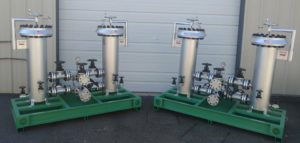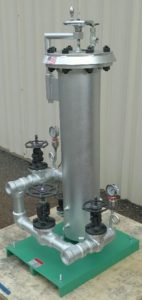
An efficient hydraulic oil filtration system is crucial to the health of hydraulic systems as they protect machine components from damage caused by the contamination of hydraulic fluids and oils. This contamination is often triggered by particulates that get caught within hydraulic fluids. Approximately one million small particles (1 micron or larger in size) enter hydraulic systems each minute. This is why investing in reliable industrial filtration systems is crucial if you want to protect your equipment’s internal components from damage.
Wear and tear of hydraulic system components are directly related to the existence of contamination within the system. Metal particles within hydraulic fluids accelerate the degradation of system components. Hydraulic oil filtration effectively removes these particulates, helping maintain the purity of hydraulic fluids on a continuous basis. The performance of industrial filtration systems can be gauged by their efficiency to remove contamination and their capacity to hold dirt and keep particles from mixing in with the fluid.
Most hydraulic systems require multi-level hydraulic oil filtration. This means that each system typically requires and contains more than one filter. Industrial filtration systems consist of discharge line filters and return line filters.
 Pressure filters, or heavy-duty filters, are used for demanding hydraulic applications—such as those installed in between high-pressure environments where conditions are much tougher and flow rates range between high to medium hydraulic system pressure rates. Heavy duty filters vary in type between duplex filters and medium pressure filters.
Pressure filters, or heavy-duty filters, are used for demanding hydraulic applications—such as those installed in between high-pressure environments where conditions are much tougher and flow rates range between high to medium hydraulic system pressure rates. Heavy duty filters vary in type between duplex filters and medium pressure filters.
On the other hand, low pressure filters, or return line filters, operate at much lower pressure levels (10 bar or less). They vary in type between suction filters and spin on filters, which are used for coarse filtration and bypass/fine filtration, respectively.
There are also standard and contamination control filters, which are designed to help protect hydraulic components from regular wear and tear and other forms of damage. Standard pressure filters offer basic protection, whereas contamination control filters offer higher degrees of protection and help improve oil quality.
Regularly replacing filter elements is crucial if you want to maintain the quality and performance of your hydraulic system.
Liquid Process Systems provides filtration systems that are extremely efficient for cleaning and maintaining the efficiency of heat transfer fluids, thermal, or hot oils. The company also specializes in in-system filtration systems, including complete, standalone systems like their Sentinel Series and Vector Series, which offer great filtering capabilities, such as the re-circulation of filter fluids within the filter unit.
